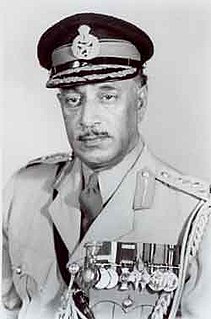 W
WDhobi Ram Chander, MVC was a civilian who was awarded the Mahavir Chakra during the Indo-Pakistani War of 1947. He is one of only two civilians to have been awarded the Mahavir Chakra.
 W
WMohammad Siddiq Choudri, HPk, MBE, HI(M), popular as HMS Choudhri, was a three-star rank admiral in the Pakistan Navy who was the first native Commander in Chief of Pakistan Navy. He was the cousin of Dr Raees M. Mushtaq's father who is a current Senior Advocate of Pakistan and is the owner of Indus Hotel Hyderabad.
 W
WVice-Admiral Afzal Akram Rahman Khan, HQA, HPk, HJ, was a three-star rank admiral, politician, and the Commander in Chief of Pakistan Navy, serving under President Ayub Khan from 1959 until 1966.
 W
WMirza Hassan Khan was a Captain of the 6th Infantry of the Jammu and Kashmir State Forces. Placed at Bunji in the Gilgit wazarat, Khan rebelled against the Maharaja's regime after his accession to India and participated in the overthrow of the Governor of Gilgit in November 1947. He later fought in the First Kashmir War as part of Gilgit rebel forces under the command of Colonel Aslam Khan and rose to become a Colonel in the Pakistan Army. After leaving the Army, he founded the Gilgit League to protest against the Pakistan's ad hoc administration of Gilgit-Baltistan.
 W
WBrigadier Muhammad Aslam Khan (1918–1994) was a Pakistani military officer, who led the Gilgit Scouts and Azad rebels in the First Kashmir War. Using the nom de guerre of 'Colonel Pasha', he organised a force of 1200 rebels and local recruits in Gilgit, and led an attack on the Indian Army and the State Forces from the north, conquering Skardu and Kargil and advancing within 30 miles of Leh. Even though the Indian Army eventually repulsed the attack beyond Kargil, Skardu remained part of the rebel territory, coming under Pakistani control at the end of the war.
 W
WSardar Muhammad Ibrahim Khan, also known as Bani-e-Kashmir and Ghazi-e-Millat, was the founder and first President of Azad Kashmir. He played a pivotal role in Operation Gulmarg .In British India of 1946, he won the Jammu and Kashmir State Assembly election as a member of the Muslim Conference party and became a member of the Praja Sabha under Maharajah Hari Singh. Jammu and Kashmir signed a stand still agreement with Pakistan as a result of the India Independence Act. In 1947, he instigated and organised the Poonch rebellion, and the Muslim League, the invasion of Jammu and Kashmir. He belonged to Sudhan tribe. This Pakistani sponsored tribal invasion, despite the stand still agreement was a rude shock to the King. He signed the Instrument of Accession with India and requested the help of Indian troops to liberate the region. The Prime Minister of India, Nehru also took the dispute to the United Nations as he could not stop the plunder and partial occupation by the invading militia.
 W
WMajor General Mohammed Zaman Kiani was an officer of the British Indian Army who later joined the Indian National Army, led by Subhas Chandra Bose, and commanded its 1st Division. He earned the Sword of Honour from the Indian Military Academy, and joined 14/1 Punjab Regiment.
 W
WField Marshal Sam Hormusji Framji Jamshedji Manekshaw,, widely known as Sam Manekshaw and Sam Bahadur, was the Chief of the Army Staff of the Indian Army during the Indo-Pakistani War of 1971, and the first Indian Army officer to be promoted to the rank of field marshal. His military career spanned four decades and five wars, beginning with service in the British Indian Army in World War II.
 W
WSahibzada Iskander Ali Mirza, CIE, OSS, OBE, was a Pakistani general and civil servant who was the first President of Pakistan. He was elected in this capacity in 1956 until being dismissed by his appointed army commander General Ayub Khan in 1958.
 W
WCaptain Raja Muhammad Sarwar Bhatti NH, BS, best known as Muhammad Sarwar, was a military officer in the Pakistan Army who was cited with the first Nishan-i-Haider for his gallant and actions of valor during the first war between India and Pakistan in 1947–48.
 W
WGeneral Satyawant Mallanna Shrinagesh was an Indian military officer who served as 3rd Chief of Army Staff of the Indian Army from 14 May 1955 till 7 May 1957. After retirement he served as the Governor of Assam from 14 October 1959 to 12 November 1960 and again from 13 January 1961 to 7 September 1962. He was the Governor of Andhra Pradesh from 8 September 1962 to 4 May 1964 and Governor of Mysore from 4 May 1964 to 2 April 1965. He also served as principal of the Administrative Staff College of India in Hyderabad, Hyderabad State from 1957 to 1959.
 W
WJemadar Nand Singh, VC, MVC was an Indian recipient of the Victoria Cross, the highest and most prestigious award for gallantry in the face of the enemy that can be awarded to British and Commonwealth forces.
 W
WGeneral Kodendera Subayya Thimayya (1906-1965), DSO was a distinguished soldier of the Indian Army who served as Chief of Army Staff from 1957 to 1961 in the crucial years leading up to the conflict with China in 1962. Gen. Thimayya was the only Indian to command an Infantry brigade in battle during the Second World War and is regarded as the most distinguished combat officer the Indian Army has produced. After the Korean War, Thimayya headed a United Nations unit dealing with the repatriation of prisoners of war. After his retirement from the Army, he was appointed Commander of the United Nations Peace Keeping Force in Cyprus from July 1964 to December 1965 and died in Cyprus while on active duty on 18 December 1965.